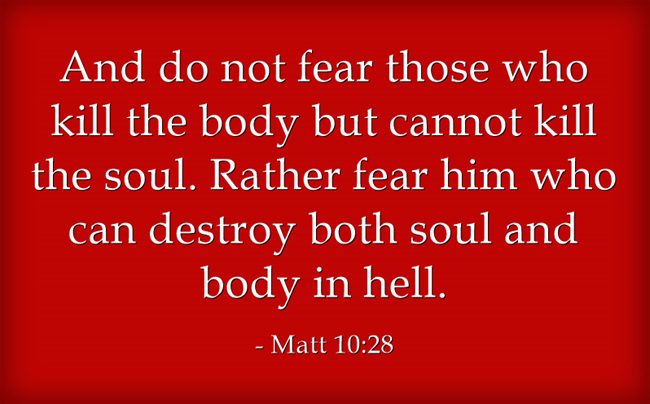How does the Bible describe hell? What does Jesus say about hell itself and what it’ll be like?
The Reality of Hell
Jesus actually spoke more about hell than the kingdom because He desires that none go there as Peter wrote “The Lord is not slow to fulfill his promise as some count slowness, but is patient toward you, not wishing that any should perish, but that all should reach repentance” (2nd Pet 3:9) but there will come a time when “The Son of Man will send his angels, and they will gather out of his kingdom all causes of sin and all law-breakers, and throw them into the fiery furnace. In that place there will be weeping and gnashing of teeth. So it will be at the end of the age. The angels will come out and separate the evil from the righteous and throw them into the fiery furnace. In that place there will be weeping and gnashing of teeth” (Matthew 13:41-42, 49-50). That is not His will for their life since “God’s kindness is intended to lead you to repentance” (Rom 2:4b) and again Paul proves that God “wants all people to be saved and to come to a knowledge of the truth” (1st Tim 2:4). Now is the time to repent and believe, according to Jesus (Mark 1:15), because after death, the judgment comes, when it is too late to repent (Heb 9:27).
The Darkness of Hell
We know that God is light and overcomes the darkness (John 1) and where God is, there is light! Those who have been reconciled to God through Christ have access to this Light of the World. Those who are going to be separated from God, you would think, would be separate from light. The religious leaders and self-righteous who believed in their own righteousness said they were Abraham’s sons….sons of the promise but Jesus says, “I say to you that many will come from the east and the west, and will take their places at the feast with Abraham, Isaac and Jacob in the kingdom of heaven. But the subjects of the kingdom will be thrown outside, into the darkness, where there will be weeping and gnashing of teeth” (Matt 8:11-12). Jesus knew they were still in darkness and so gave the Parable of the Wedding Banquet and said, “when the king came in to see the guests, he noticed a man there who was not wearing wedding clothes. He asked, ‘How did you get in here without wedding clothes, friend?’ The man was speechless” (Matt 22:11-12) and that’s when “the king told the attendants, ‘Tie him hand and foot, and throw him outside, into the darkness, where there will be weeping and gnashing of teeth” (Matt 22:13). The children of Abraham thought they were going to be in the kingdom but tragically they will be cast out and tied up and then thrown into darkness. This idea of being cast “outside, into the darkness, where there will be weeping and gnashing of teeth” (Matt 25:30) are frequently used as references for hell.
The worm that Turns
Every one of us has a conscience. We know what is right and what is wrong from a very early age. Few people have no regrets in their life but that’s also part of how we grow as individuals. The greatest mistake is when people deny the existence of God as Paul wrote, “what can be known about God is plain to them, because God has shown it to them” (Rom 1:19) since “his invisible attributes, namely, his eternal power and divine nature, have been clearly perceived, ever since the creation of the world, in the things that have been made. So they are without excuse” (Rom 1:20). They have “exchanged the truth about God for a lie and worshiped and served the creature rather than the Creator” (Rom 1:25) and “the creature” could well be themselves. Their own “god,” whatever it is, is that which takes precedence in a person’s life. For a time in my life, before I was born again, I was my own “god” as it was all about me. I lived to serve me but in one place Jesus says something that makes hell seem to be a place of regret; “And if your eye causes you to stumble, cast it out; it is better for you to enter the kingdom of God with one eye, than having two eyes, to be cast into hell, where their worm does not die, and the fire is not quenched” (Mark 9:47-48). Notice that it’s not just “a worm” but “their worm does not die.” The phrase “the worm never turns” means that the worm will turn on its attacker, in the sense of counterattacking, fighting back, but this worm Jesus spoke about may be the inner conscience whereby unbelievers “suppress the truth” (Rom 1:18) and they live with that regret (ever turning) forever.
Fire and Judgment
Jesus speaks the fiery judgment of hell so much (Matt 13:41-42) that it makes us ask, “Is there literal fire in hell?” This fire is said to be “the unquenchable fire” not “an unquenchable fire” perhaps indicating that each person’s hell is different. Jesus shows us that there are different degrees of punishment in hell when He said “that servant who knew his master’s will but did not get ready or act according to his will, will receive a severe beating” (Luke 12:47). In the story of the Rich Man and Lazarus, there was memory of the rich man’s former life and family, there was a fire that could not be quenched, there was thirst so we’ll have all of our senses, and we’ll have regret meaning that our conscience will still be active (Luke 16:19-31). We’ll also be separated from God. Is it a literal fire intense mental anguish? That “weeping and gnashing” indicate utter despair and eternal regret. You could always tell when my cousin was anxious; he would be grinding his teeth. He did it more when we had to wait for an appointment or something. The longer he waited, the more he gritted his teeth. He was simply “gnashing” his teeth…waiting, hoping, longing…but unlike his appointment, those in hell wait forever. All who enter here, it was said of hell, abandon all hope.
Conclusion
Imagine those who think they are good enough to go to heaven because they’re a good person. For those who think that way, as I did once, read this example of people who believe they’ll go to heaven because they’ve been a good person. Jesus told the Jews and someday may say to self-professed “good people,” “There will be weeping there, and gnashing of teeth, when you see Abraham, Isaac and Jacob and all the prophets in the kingdom of God, but you yourselves thrown out” (Luke 13:28). Weeping and gnashing (grinding) are often mentioned with “the outer darkness.” Is hell the total absence of light? Will the lost see others people they knew were Christian being seated at the Wedding Banquet while they are not? Will the saved see others who only professed Christ but were not saved and they’ll be missing and some who they thought weren’t saved, end up being there? Jesus said the Jews would see patriarchs at the Banquet but they’re not invited? Are you?
Article by Jack Wellman
Jack Wellman is Pastor of the Mulvane Brethren church in Mulvane Kansas. Jack is also the Senior Writer at What Christians Want To Know whose mission is to equip, encourage, and energize Christians and to address questions about the believer’s daily walk with God and the Bible. You can follow Jack on Google Plus or check out his book Teaching Children the Gospel available on Amazon.












